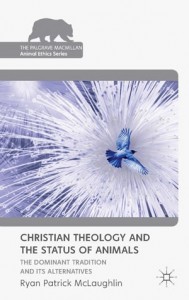Latest news
Christianity and the Status of Animals Published
5th March 2014
 Associate Fellow of the Oxford Centre for Animal Ethics, Ryan Patrick McLaughlin, has published a book of both breadth and depth concerning the moral standing of nonhuman animals within the Christian tradition(s).
Associate Fellow of the Oxford Centre for Animal Ethics, Ryan Patrick McLaughlin, has published a book of both breadth and depth concerning the moral standing of nonhuman animals within the Christian tradition(s).
McLaughlin argues that there are conflicting traditions with regard animals. The dominant—that is, most common—tradition maintains that animals are primarily resources that humans ought to distribute equitably to the entire human community, both present and future. This strand is represented in the work of Thomas Aquinas and is promulgated in many contemporary magisterial documents of the Roman Catholic Church.
McLaughlin delineates alternatives to this strand within Christian theology. These include the re–envisioning of the moral significance of differentiation, the image of both protological and eschatological peace between humans and animals in both ancient and modern writers, biblical passages that challenge anthropocentrism and suggest humans are called to more than the preservation and conservation of nature “as it is,” and the notion that the cosmos is the primordial sacrament. These alternatives to the dominant tradition open fresh opportunities for interreligious dialogue. Furthermore, they reveal open spaces within which Christian theology can afford direct moral concern to animals.
This book is part of Palgrave Macmillan’s Animal Ethics Series published in partnership with the Centre. More information about the book can be obtained here.
Ryan Patrick McLaughlin, PhD, is an adjunct instructor at Duquesne University, USA. He has authored articles on animal theology, comparative religious ethics, and biblical foundations for religious inclusivism. He also has a forthcoming book through Fortress Press entitled Preservation and Protest: Theological Foundations for Eco–Eschatological Ethics.